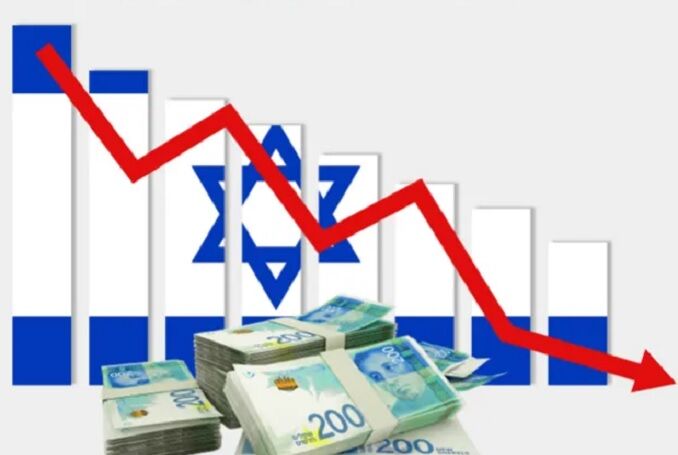Masoud Barati, an expert on the Zionist regime’s affairs, in an interview with the website of the Strategic Council on Foreign Relations, recalled: In the early days of the war, the World Bank published an analysis and announced that the economy of the Zionist regime would shrink by about 10 percent as a result of the war; but it seems that the figure will increase as the war drags on.
Regarding the economic problems caused by the war for the Zionist regime, he said: The first problem is the disruption of the tourism industry in the Zionist regime, which is one of the main sources of income for the regime, which has now significantly decreased due to the war.
He continued: The next issue is the removal of about 200,000 people from the economic cycle of the Zionist regime who lived around the Gaza Strip and the settlements around the Strip. Those Zionists evacuated all the settlements, and this means that the government of the Zionist regime is forced to take them to other areas and cities and give them accommodation and cover their expenses. This issue causes greater economic pressure on the Zionist regime.
Barati clarified: In addition to the war, the indirect cost of bringing 300,000 reserve forces to the battlefield means removing them from the economic cycle, which will impose additional costs on the economy of the Zionist regime. Therefore, the budget deficit of the Zionist regime will be huge next year, and the longer the war lasts, the economic problems of the regime will also increase.
The expert continued: The economic costs of the regime in war conditions and also the cost of ammunition such as the Iron Dome are very high. One of the factors that always forced the Zionist regime to end the war early was economic pressure.
Barati said: One of the factors in reducing the economic pressure on the Zionist regime has been the American and European aid since the beginning of the war. Such aid is so much that it has upset Ukraine because with the beginning of the Gaza war, Western aid to Ukraine for the war with Russia has decreased, and most of that aid goes to the Zionist regime.
He added: Basically, one of the factors that prevented the collapse of the Zionist regime’s economy is the foreign aid that is given to the Zionist regime annually, which has already increased after the Gaza war.
On challenges the US has faced because of the war of the Zionist regime, the expert said: Among the challenges, the regional projects of the Americans in the Indo-Arab-Zionist regime corridor, which is one of the competitors of the Chinese Belt and Road Initiative, have been suspended to a large extent, and the economic projects in the region that were supposed to be completed with the normalization of relations between the Zionist regime and Saudi Arabia, has encountered with a problem.
Barati continued: In addition, the more the war goes on, the more likely it will become a regional war. If this war becomes a regional war, the costs will multiply, and this will be detrimental to the strategic interests of the US, especially in the competition and confrontation with China and Russia.
At the same time, he considered non-interruption in the economic cooperation of some Arab and Islamic countries with the Zionist regime as a matter to be seriously criticized. He said: Many Islamic countries such as Turkey and the UAE took strong positions against the war and crimes of the Zionist regime in Gaza but did not so much change in their economic relations with that regime. This made the Zionist regime realize that their objections were grave.
Barati added: In the 1973 war, the Arab governments imposed an oil embargo on the US and the Zionist regime. At the same time, this action caused the price of oil to increase by 24 times, and this issue put pressure on the Americans and even the Zionist regime itself so that the war did not continue for more than 20 days. When there is no similar will in the current situation, the Zionist regime can continue the war by receiving various aid from the US and Europe.
The expert noted that the economy of the Zionist regime will suffer from fragility, and this problem will show itself more in 2024 in the case of unemployment, inflation, and budget deficit.










0 Comments